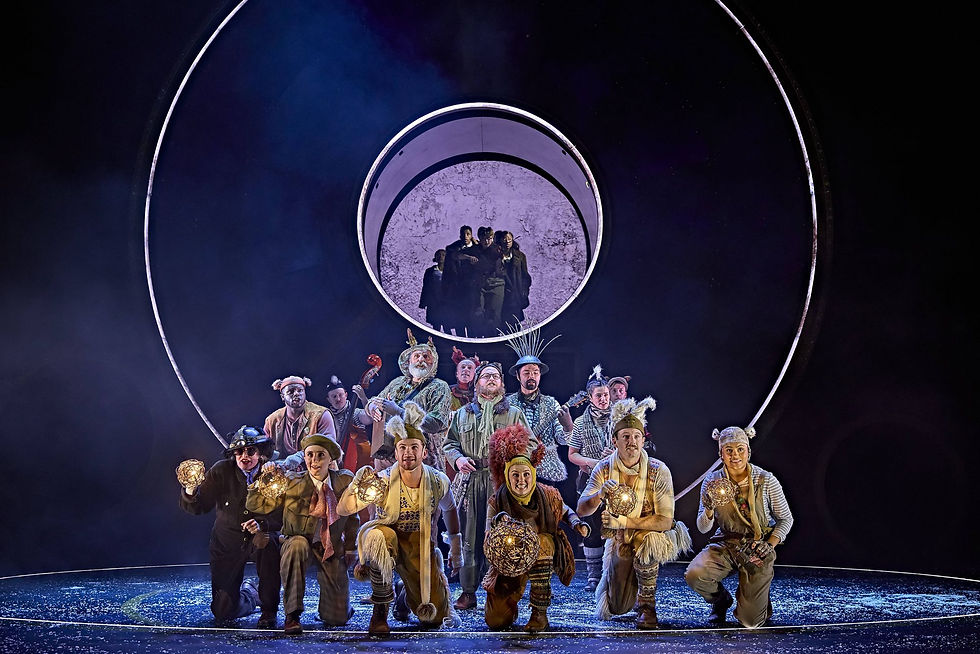The Beekeeper of Aleppo UK Tour - Theatre Royal Plymouth Review
- Becky Wallis
- Jun 21, 2023
- 3 min read
Updated: 3 days ago
Heartbreak, grief, treacherous journeys, loss, war, mental health and the process of seeking asylum, a hard-hitting combination that may be difficult to convey in a way which people would be able to understand and relate too, but these are all topics that are bravely and sensitively covered in the stage adaptation of Christy Lefteri’s number one best seller ‘The Beekeeper of Aleppo’.
Driven from their home by war and threats upon their lives, married couple Nuri (Alfred Clay) and Afra (Roxi Faridany) are faced with the perilous journey from Aleppo in Syria to the UK where they wish to seek asylum. Along the way, they experience crowded refugee camps, border crossings, people smugglers, criminals, crisis of health, and the jumping through hoops to gain help.
It is Alfred Clay’s Nuri that both leads the story and holds it together. The show opens with a voice asking him to explain why he has come to the UK, asking him to describe his journey and we are taken on that journey with him. He is a devoted man, a loving husband to Afra and passionate about his job as a beekeeper where he works alongside his cousin Mustafa (Joseph Long). As the piece progresses, we learn more and more about Nuri, why he acts in the way that he does and how both his decisions and the terrible things that he has experienced have affected him, and Clay is able to embody all of that.
As Afra, Roxy Faridany has to illustrate the pain of a mother who has experienced such trauma that her eye sight is failing her, and she does so in impressive fashion. There is pain in everything about her character, as she pleads for her hand to be held out of love instead of guiding and she questions her husband’s strange and troubling behaviour. Joseph Long plays both Mustafa, the family man who loves nothing more than his children and his bees, and a friendly Moroccan referee who ends up in the same bed and breakfast as the couple and delights in learning everything he can about being British. He is able to expertly balance the light and the dark, the heartache and the comedy.

The ensemble play a series of characters, each seamlessly fitting into the story as fellow refugees, home office workers, doctors and those who either help or hinder the couple’s long journey. Nadia Williams’ Angliki pulls at the heartstrings and Elham Mahyoub’s Mohammad adds a sense of innocence and highlights the pain that faces the children of war.
Throughout the piece, the action jumps back and forth in time, to the good memories of life in Aleppo before the war, the time after the war began, the couple’s journey and their lives in the UK. Overall, this is an effective storytelling tool as we see the entire story in a series of flashbacks from Nuri’s perspective, allowing us to see into his mind as he battles with the effects of all that he has been through. Nevertheless, the regular jumping backwards and forwards can prove a little bit confusing. Throughout the entire piece, only one rough date is mentioned; March 2011, when the war in Syria began. But that’s it. The audience are not given any indication as to how long the couple stayed in Aleppo after the outbreak of war, how long it took them to get from Syria to the UK, or how long the process of seeking asylum has taken. I can’t help but feel that putting dates onto the background as images of the story are projected would have been rather beneficial.
Ruby Pugh’s set is simple, rather bare but effective. Simply a bed and a chair half buried in the desert sand, lost in the former home of our lead couple, or perhaps they are remnants in the rubble, but either way they become the world of Nuri and Afra; a dinghy, shelter, a park bench and a taste of home. Paired with Ben Ormerod’s powerful lighting, Ravi Deepre’s films and Tingying Dong’s sound, a captivating setting is created.
‘The Beekeeper of Aleppo’ is a war story, but below the surface it is much more than that. It’s an exploration not only of the dangerous journey that refugees are forced to take but also the emotional consequences of it, the effect on the mental health of those who have experienced it. Throughout the production, it is easy to feel for the characters, and have your eyes opened to the all too painful truth that lies behind this fictional tale.





Comments